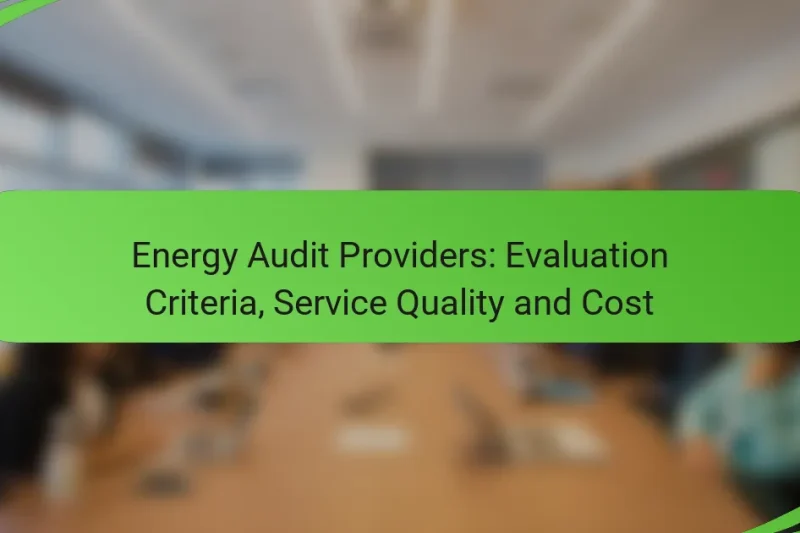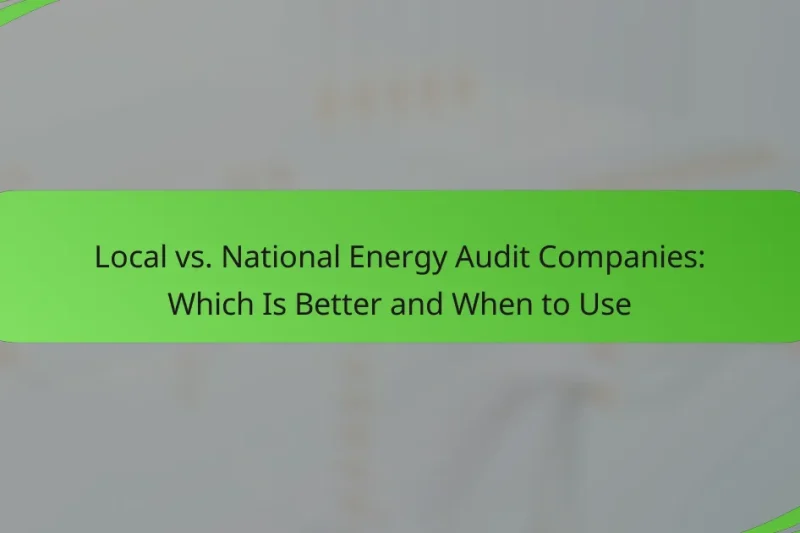Energy audit professionals play a crucial role in enhancing building performance and sustainability through their expertise … Energy Audit Professionals: Certifications, Qualifications and StandardsRead more
Choosing the Right Energy Audit Provider
Choosing the right energy audit provider is crucial for maximizing energy efficiency in your home or business. By evaluating their qualifications, reputation, and service offerings, you can ensure that you select a provider capable of meeting your specific energy needs. A professional energy audit can reveal valuable insights into your energy consumption and highlight opportunities for cost savings and property value enhancement.
Affordable Energy Audit Services: Finding Options in Your Area
Finding affordable energy audit services in your area can significantly enhance your home’s energy efficiency while … Affordable Energy Audit Services: Finding Options in Your AreaRead more
Energy Audit Providers: Evaluation Criteria, Service Quality and Cost
When selecting an energy audit provider, it’s essential to evaluate their experience, service offerings, and customer … Energy Audit Providers: Evaluation Criteria, Service Quality and CostRead more
Energy Audit Providers: Customer Reviews, Ratings and Insights
Energy audit providers play a crucial role in helping businesses and homeowners optimize their energy usage … Energy Audit Providers: Customer Reviews, Ratings and InsightsRead more
Provider Experience: Impact on Energy Audit Results and Effectiveness
The experience of energy audit providers plays a crucial role in determining the effectiveness and accuracy … Provider Experience: Impact on Energy Audit Results and EffectivenessRead more
Energy Audit Service: Key Questions to Ask Before Hiring
Before hiring an energy audit service, it’s essential to consider their familiarity with local regulations and … Energy Audit Service: Key Questions to Ask Before HiringRead more
Local vs. National Energy Audit Companies: Which Is Better and When to Use
When deciding between local and national energy audit companies, it’s essential to consider the unique advantages … Local vs. National Energy Audit Companies: Which Is Better and When to UseRead more
How to choose the best energy audit provider in the USA?
To choose the best energy audit provider in the USA, focus on their qualifications, reputation, and the specific services they offer. A thorough evaluation of these factors will help ensure you select a provider that meets your energy efficiency needs effectively.
Consider provider certifications
When selecting an energy audit provider, check for relevant certifications that demonstrate their expertise and adherence to industry standards. Look for certifications from recognized organizations such as the Building Performance Institute (BPI) or the Residential Energy Services Network (RESNET).
These certifications indicate that the provider has undergone rigorous training and is knowledgeable about energy efficiency practices. Additionally, some states may require specific licenses or certifications, so verify local regulations to ensure compliance.
Evaluate customer reviews
Customer reviews can provide valuable insights into the quality of service offered by an energy audit provider. Look for reviews on platforms like Google, Yelp, or specialized energy efficiency forums to gauge customer satisfaction and the effectiveness of the audits performed.
Pay attention to both positive and negative feedback. Consistent praise for thoroughness and professionalism is a good sign, while repeated complaints about poor communication or incomplete audits should raise red flags.
Assess service offerings
Different energy audit providers may offer varying levels of service, so it’s essential to assess what each provider includes in their audits. Some may provide comprehensive assessments that cover insulation, HVAC systems, and appliance efficiency, while others might focus on specific areas.
Consider what services are most relevant to your needs. For instance, if you live in an older home, you may want a provider that specializes in retrofitting and energy-efficient upgrades.
Compare pricing structures
Pricing for energy audits can vary widely, so it’s important to compare the costs associated with different providers. Some may charge a flat fee, while others might base their pricing on the size of your home or the complexity of the audit.
Request detailed quotes from multiple providers to understand what is included in the price. Be wary of prices that seem too low, as they may indicate a lack of thoroughness or hidden fees. Aim for a balance between cost and the quality of service offered.
What services do energy audit providers offer?
Energy audit providers offer a range of services designed to assess and improve energy efficiency in homes and businesses. These services typically include detailed evaluations of energy use, recommendations for upgrades, and assistance with utility rebates.
Home energy assessments
Home energy assessments focus on identifying how energy is used in residential properties and pinpointing areas for improvement. Providers often conduct on-site inspections, analyze energy bills, and use diagnostic tools to evaluate insulation, heating, and cooling systems.
During an assessment, homeowners may receive recommendations for energy-efficient appliances, insulation upgrades, or smart home technologies. These improvements can lead to significant savings on energy bills, often ranging from 10% to 30% annually.
Commercial energy audits
Commercial energy audits are tailored for businesses and larger facilities, focusing on optimizing energy use and reducing operational costs. These audits typically involve a comprehensive analysis of energy consumption patterns, equipment efficiency, and facility design.
Businesses can benefit from identifying energy-saving opportunities such as upgrading lighting systems, improving HVAC efficiency, or implementing energy management systems. The potential savings can be substantial, sometimes exceeding 20% of total energy costs.
Utility rebate assistance
Utility rebate assistance helps customers navigate available incentives for energy efficiency improvements. Energy audit providers often have expertise in local utility programs and can guide clients through the application process for rebates and incentives.
By leveraging these rebates, customers can significantly reduce the upfront costs of energy-efficient upgrades. It’s essential to check eligibility requirements and deadlines, as these can vary by utility provider and location.
What are the benefits of hiring a professional energy auditor?
Hiring a professional energy auditor provides valuable insights into your energy consumption and identifies opportunities for improvement. These experts can help you enhance efficiency, reduce costs, and increase the overall value of your property.
Improved energy efficiency
Professional energy auditors assess your building’s energy use and pinpoint areas where efficiency can be enhanced. They often use specialized tools and techniques, such as thermal imaging and blower door tests, to identify leaks and inefficiencies that may not be visible to the untrained eye.
By implementing their recommendations, property owners can significantly reduce energy waste, leading to a more sustainable operation. This not only benefits the environment but also contributes to lower energy consumption over time.
Cost savings on utility bills
One of the most immediate benefits of hiring an energy auditor is the potential for substantial cost savings on utility bills. By identifying inefficiencies and suggesting improvements, auditors can help you lower your monthly energy expenses.
For instance, simple actions like sealing air leaks or upgrading insulation can lead to savings of 10-30% on heating and cooling costs. These savings can quickly offset the cost of the audit itself, making it a financially sound investment.
Increased property value
Improving energy efficiency not only reduces costs but can also enhance the overall value of your property. Energy-efficient buildings are increasingly attractive to buyers and tenants, as they promise lower operating costs and a reduced environmental footprint.
Investing in energy audits and subsequent upgrades can yield a higher return on investment, especially in markets where energy efficiency is a priority. Properties with Energy Star ratings or similar certifications often command higher prices and faster sales.
What should you expect during an energy audit?
During an energy audit, you can expect a comprehensive evaluation of your energy usage and efficiency. This process typically involves an initial consultation, an on-site assessment, and a detailed report with recommendations for improvements.
Initial consultation process
The initial consultation is your opportunity to discuss your energy concerns and goals with the audit provider. This meeting usually covers your current energy bills, any specific issues you’ve noticed, and your expectations from the audit.
Be prepared to provide information about your building’s layout, systems in use, and any previous energy assessments. This helps the auditor tailor the audit to your specific needs.
On-site assessment details
The on-site assessment involves a thorough examination of your property, focusing on areas such as insulation, HVAC systems, lighting, and appliances. Auditors may use tools like thermal imaging cameras and blower doors to identify energy leaks and inefficiencies.
Expect the assessment to take several hours, depending on the size of your facility. The auditor will likely take measurements and gather data to analyze your energy consumption patterns.
Post-audit report and recommendations
After the audit, you’ll receive a detailed report outlining findings and actionable recommendations. This report typically includes an analysis of your energy usage, potential savings, and suggested improvements.
Recommendations may range from simple changes, like switching to LED lighting, to more significant investments, such as upgrading HVAC systems. The report should also prioritize actions based on cost-effectiveness and potential return on investment.
How to verify the credentials of an energy audit provider?
To verify the credentials of an energy audit provider, check their certifications, review their past projects, and contact references. These steps ensure that the provider has the necessary expertise and a proven track record in delivering quality energy audits.
Check for industry certifications
Start by confirming that the energy audit provider holds relevant industry certifications. Look for certifications from recognized organizations such as the Association of Energy Engineers (AEE) or the Building Performance Institute (BPI). These credentials indicate that the provider adheres to established standards and practices in energy auditing.
Additionally, check if they comply with local regulations or standards, which may vary by region. For instance, in the EU, providers might need to meet specific energy efficiency directives.
Review past project portfolios
Examine the provider’s past project portfolios to assess their experience and expertise. A strong portfolio should showcase a variety of projects, including residential, commercial, and industrial audits. Look for case studies that highlight the energy savings achieved and the methods used.
Consider the scale and complexity of the projects they have handled. Providers with experience in similar types of buildings or industries as yours are likely to understand your specific needs better.
Contact references
Reach out to references provided by the energy audit provider to gain insights into their performance. Ask previous clients about their experiences, focusing on the provider’s reliability, communication, and the quality of the audit results. This feedback can help you gauge whether the provider meets expectations.
Additionally, inquire about the long-term impacts of the audit, such as energy savings and improvements in efficiency. Positive testimonials can be a strong indicator of a provider’s capability and commitment to client satisfaction.
What are the common pricing models for energy audits?
Energy audits typically follow several pricing models, including fixed fees, hourly rates, and performance-based pricing. Understanding these models helps you choose a provider that aligns with your budget and project goals.
Fixed Fee Pricing
Fixed fee pricing involves a set cost for the entire energy audit, regardless of the time spent. This model is beneficial for clients who prefer budget certainty and want to avoid unexpected expenses. Typically, fixed fees can range from a few hundred to several thousand dollars, depending on the complexity and size of the facility.
Hourly Rate Pricing
Hourly rate pricing charges clients based on the actual time spent conducting the audit. This model can be advantageous for smaller projects or when the scope is unclear. Rates can vary widely, often falling between $50 to $200 per hour, depending on the auditor’s expertise and location.
Performance-Based Pricing
Performance-based pricing ties the cost of the audit to the energy savings achieved post-implementation. This model aligns the auditor’s incentives with the client’s goals, making it a compelling option for those focused on long-term savings. However, it may involve more complex contracts and requires clear metrics for measuring success.






